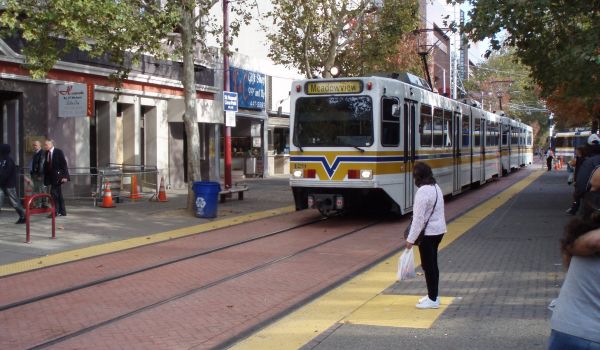Introducing Urban Nation, an occasional column by Ben Adler, NAC’s federal correspondent, on the latest urban-related policy issues in Washington.
Every urbanist knows that America has a transportation problem: A car-dependent landscape and policies at every level of government that favor drivers over pedestrians, bicyclists and straphangers. But according to a new report by the American Association of People with Disabilities and the Leadership Conference on Civil and Human Rights (LCCR), the U.S. is also badly ignoring the transportation needs of people with disabilities.
Of the nearly 2 million people with disabilities who never leave their homes, “560,000 never leave home because of transportation difficulties,” notes the report. “Adults with disabilities are twice as likely as those without disabilities to have inadequate transportation (31 percent vs. 13 percent).”
The Americans with Disabilities Act (ADA) only requires disability accessibility in new public transit construction. Older urban transit systems, such as New York’s and Boston’s, have yet to be retrofitted with the necessary elevators. Stations can even be heavily renovated without being made accessible to people with disabilities. Perversely, since the ADA only requires that disabled people be accommodated in places that offer mass transit in the first place, localities without public transit are under virtually no obligation to assist in disabled mobility at all.
AAPD explains: “Because the ADA only addresses public transportation, few transportation options exist for people with disabilities where no public transportation is available. In some areas, such as in rural communities, insufficient funding has left people with disabilities with little or no transportation options. In urban areas, where individuals often rely on accessible taxis, a lack of requirements has meant very uneven progress.” (New York City Mayor Mike Bloomberg’s decision to select a “Taxi of Tomorrow” that will not be wheelchair accessible is a case in point.)
Even in cities that have mass transit systems, enforcement is a problem, since the federal government does not monitor and punish localities for failure to comply with the ADA. Rather, it depends on victims of anti-disabled discrimination to file lawsuits and win in federal court. The ADA requires that cities with inaccessible mass transit systems offer alternative transportation for people with disabilities. Unfortunately, according to the AAPD, these “paratransit” systems have often failed to live up to their promise.
From the report:
Paratransit use has soared in the past 20 years, along with its costs. However, users in many cities experience significant problems with their paratransit systems, including problems with service quality and capacity limitations. Specific paratransit service is crucial for those individuals who rely on it to get around. Failure of paratransit to show up or to provide effective service not only causes frustration but can also cause missed health appointments and employment problems for those who need to get to work. Problems include: restrictive eligibility criteria; unfair trip denials; tardiness or failure to show; slow service en route; inefficient and unfriendly telephone reservation systems; inaccurate information; failure to respond to complaints; lack of training for drivers; drivers’ lack of respect for users; and punitive cancellation policies.
Congress is currently debating the long-overdue Surface Transportation Reauthorization, the mechanism by which the federal government disburses the money collected by our national 18.4 cent per gallon gasoline tax. Historically, the money has simply been doled out to states according to formulas that give about 80 percent to highways and 20 percent to mass transit, covering only construction and capital improvements, not operating costs. Democrats such as President Obama and former Rep. Jim Oberstar (D-MN) have proposed more ambitious and holistic ways of using the money to encourage goals such as economic efficiency, environmental sustainability and complete streets that would encourage uses other than driving.
House Republicans have shown no interest whatsoever in this approach. That’s unfortunate, because complete streets and its accoutrements of access benefit all non-drivers, including the disabled. Indeed, the reauthorization of a complete streets-minded Surface Transportation Bill presents an opportunity to rethink the accessibility of our communities for all people, including the least-mobile among us.
“Rights-of-way include streets, sidewalks, crosswalks, curb ramps, crossing signals, street parking, and other public infrastructure, and are crucial to viable transportation for people with disabilities,” writes AAPD. “People with disabilities in communities across the country continue to face barriers such as inaccessible bus stops, intersections without curb ramps, street crossings and pedestrian signals that are not audible to individuals with visual disabilities, and barriers such as telephone poles blocking sidewalks. If people with disabilities cannot even get down their streets, they will be unable to connect to other forms of transportation.”
The report recommends the same basic components of federal legislation that environmentalists and urban planners have been requesting for years: Dedicated funding for mass transit, a priority to “fix it first” rather than building new roads while old ones crumble, and funding for operating transit services. If Congress doesn’t pass such a law, people with disabilities could remain confined to their homes for years to come.

Ben Adler is a journalist in New York. He is a former reporter for Grist, The Nation, Newsweek and Politico, and he has written for The New York Times, The Atlantic, The Guardian and The New Republic.




_600_350_80_s_c1.jpg)











